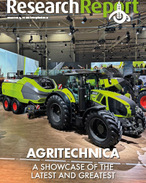This article is 2 years old. Images might not display.
The non-invasive technology, which uses low power, non-ionizing electromagnetic waves, can be used on both live and processed animals.
The device is part of the Advanced Livestock Measurement Technologies (ALMTech) program which has been working to develop advanced measurements of red meat quality and quantity that will enhance the Australian beef, lamb, and pork industries' ability to respond to demands and capture value-chain price differentials.
The program is supported by funding from the Australian Government Department of Agriculture, Fisheries & Forestry as part of its Rural Research and Development for Profit Programme, in partnership with Meat & Livestock Australia, Australian Meat Processor Corporation, Australian Pork Limited, commercial companies, state government departments and universities.
Western Australia's Dardanup Butchering Company (DBC) has embraced the technology for measuring fat depth in lamb.
"The technology works really well with sheep - it's much better than what we had been using before," DBC general manager, Brian Pittendreigh said.
"The beauty of it is that it takes the human element out of the equation - it's a machine that's really accurately reading the fat depth rather than human eyes."
DBC has been working with the ALMTech team for more than two years in assessing the performance of the microwave device and providing feedback to refine its design.
Pittendreigh said the microwave device provided more accurate information to the business, which is currently interfacing the technology into its data recording systems, and would potentially provide some relief from the labour shortages affecting the industry.
"Since Covid, finding workers has been very difficult, so if this technology can eventually replace one work-station, then it will pay for itself pretty quickly," he said.
"And if it can be enhanced to the point that it can measure intramuscular fat and meat yield, it will be a big asset for meeting our customers' preferences."
Pittendreigh said the technology was also showing promising signs in assessing fat depth in cattle and pigs, although further refinement was needed before it could be deployed commercially.
"The prototypes have to be a little more robust to work on a commercial slaughter floor situation for a long period and that's probably the most difficult final challenge that remains for the researchers," he said.
ALMTech chief investigator, Professor Graham Gardner said AUS-MEAT accreditation had been successfully achieved for the use of the technology in assessing GR tissue depth in lamb, which acts as a crucial enabler in facilitating the adoption of the microwave probe across industry.
"Our ALMTech engineering team led by Dr Jayaseelan Marimuthu has really worked on this prototype to make the hardware more compact in size, have a longer battery life, and more robust in design with a splash-proof outer shell," Professor Gardner said.
"We're confident that the technology will be commercially available early next year. The DBC installation is a crucial testing ground for this device."























